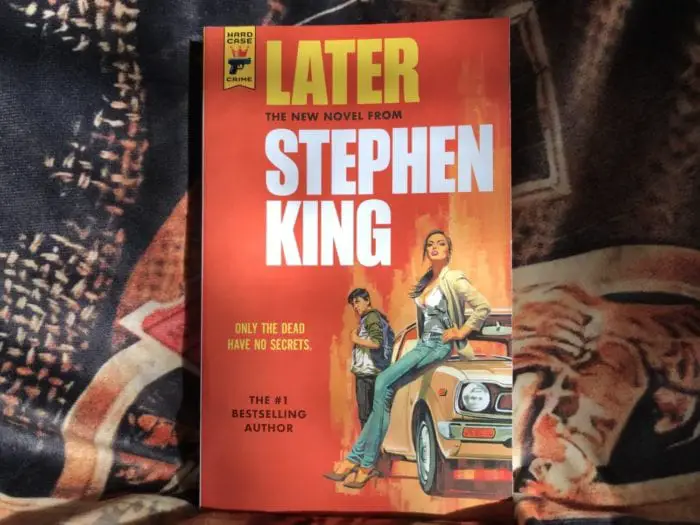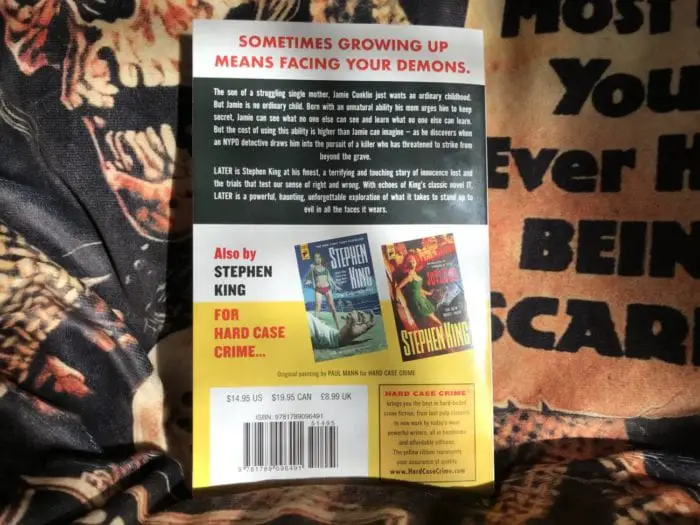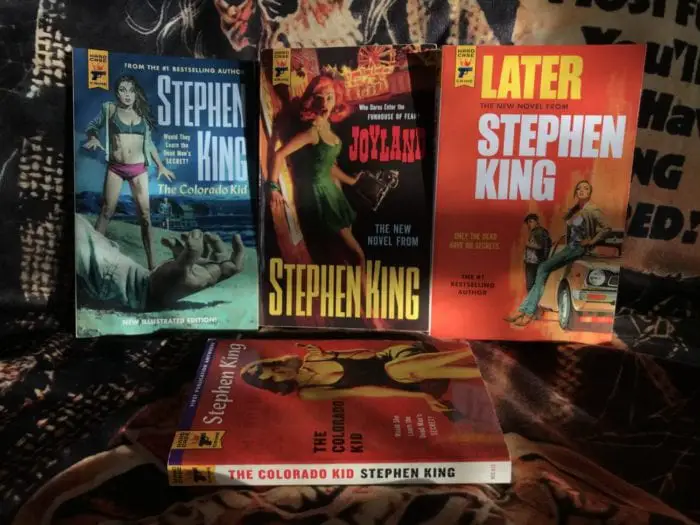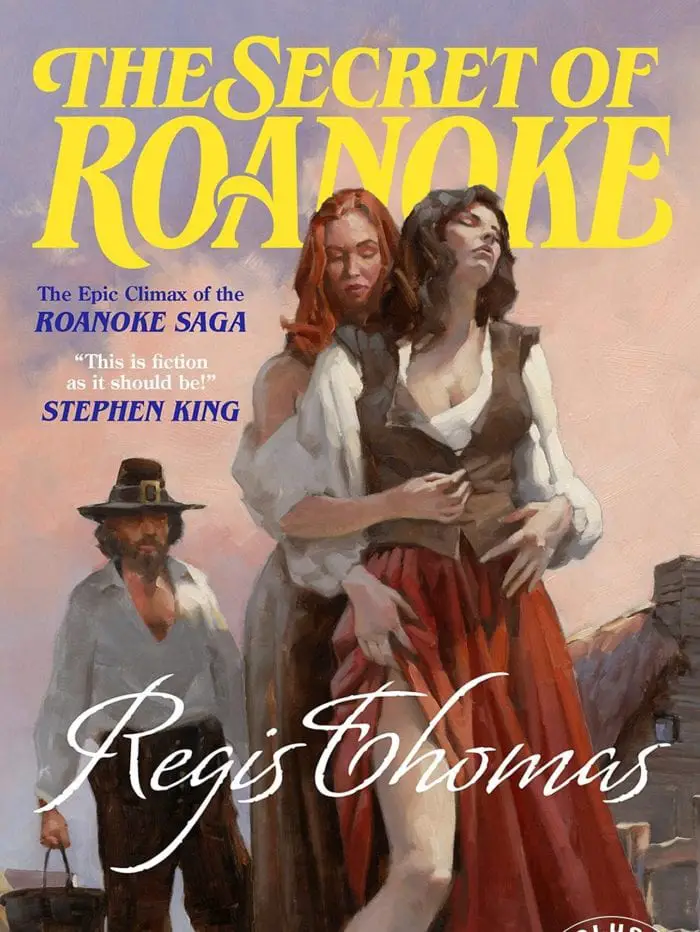Never one to rest on his literary laurels, Stephen King is back with a new novel, Later, less than a full year since the release of If It Bleeds. Later, published by Hard Case Crime, is a tale that finely mixes supernatural elements with the detective genre, bringing forth a hybrid beast that ought to satisfy lovers of both. Initially, when planning the layout of this article, I wanted to go for a spoiler-free approach, encouraging readers near and far to pick up this paperback and give it a go. That was when I was halfway through the book. I’ll get to that in a minute because I think it’s an important thing to address. I’ll be dividing this article into three parts, dear reader: a part for those who don’t want to know, those who kind of do, and those who definitely do. Alright, here we go!
You Are In The Spoiler-Free Zone
Relax, you’re safe. I’ll give a call signal when we’re heading into the later stages (see what I did there?). For now, here’s a nice little plot synopsis!

Jamie Conklin is the son of a struggling literary agent in New York City, born with the gift (is it a gift?) of seeing the dead. Through a compelling first-person narration, peppered with shades of Salinger’s The Catcher In The Rye, Jamie walks you through a series of events the likes of which M. Night Shyamalan could only wish he’d thought of first. When Jamie is called upon to help his mother by using his unique ability, the talent reveals itself to his mother’s girlfriend, NYPD Detective Liz Dutton. Liz—crooked and flawed, to say the least—decides to exploit Jamie’s ability to see and converse with the dead for her own personal interests. What follows brings Jamie to the precipice of understanding just how powerful his ability is and, most importantly, the harm it can lead to.
That’s as spoiler-free as I can get, this side of copying the description on the back of the book! With that in mind, let’s examine some of the incredibly cool aspects of this novel and King’s writing.
Jamie’s ability to see the dead (the recently dead, I should specify) is presented in such a way that feels casual. This sort of nonchalant approach eventually brings the reader to what I want to warn you of later—and yes, I am saying later a lot on purpose. You’ll understand when you read the book. Through the superb narration, you walk in Jamie’s shoes through paths of youthful uncertainty, coming across the freshly deceased in ways both amusing and grizzly. Great fun! I can’t stress enough the Holden Caulfield vibes Jamie gives me. He’s Holden without a chip on his shoulder. Also great fun.

The manner in which King writes the aspects of Jamie’s ability is astounding. The setting up of the rules the dead are obligated to follow fits perfectly into the world the characters inhabit. The newly departed can (but don’t always) appear for a matter of days after their death. Their voices begin to fade the longer Jamie spends time with them, an element which proves to be mightily important as the story progresses. There’s an immediacy such a rule brings to the whole thing, and it takes the reader on quick rides into the lives of the people Jamie sees.
Perhaps most critically, when asked a question, the dead must give a truthful answer. They can struggle not to tell the truth, dance around answering, but eventually they must spill any and all beans. The novel’s tagline, “Only The Dead Have No Secrets,” proves to be more literal than one might initially imagine. The dead aren’t ghosts, they’re simply referred to as “dead people,” and that differentiating tactic alone casts this story into a different category than just another ghost/detective novel. The key to the novel’s uniqueness are these rules, the viewpoint Jamie brings, and the eloquent way King handles both the lives of the living and the former lives of the dead.

Here is a good place to mention—still in the Spoiler-Free Zone—that there’s a concept from another, older, and much beloved novel of King’s that is utilized in Later. For my money, this thing (which, if you stick around to the end, I’ll tell you about) enriches the story greatly. This concept opens Later up to the rest of the Stephen King universe, which a separate reference early on seems to close the novel off from. I dug it quite a bit, and any Constant Reader out there will too!
Like any great Stephen King novel, there are compelling side stories woven in and out of Later. Never looking to overtake the throne from the primary narrative, these twists and turns add depth in most places, particularly in the relationship between Jamie, his mother Tia, and dirty detective Liz Dutton. There’s a novelist character, Regis Thomas, acclaimed author of The Roanoke Saga book series, who ends up having an interesting encounter with Jamie, Mom, and Liz. Classic and classy. It all fits together so nicely, leading me through the novel on a seamless road. I loved every second. The farthest reaches and implication of being able to see and communicate with the dead—even just briefly—are explored effortlessly and to ghastly results. Great fun, as I’ve said. Later, however (much later) Later stumbles over its own feet with a particular side story. That’ll be addressed soon, but for now I’ll just wrap up the spoiler-free section. Sound good? Cool.
Well, for those of you who want to go completely blind into Later, this is where we part ways. I sincerely hope you enjoy the novel as thoroughly as I did. It is my wish that you’ll appreciate the expansion of the basic plot element of The Sixth Sense crossed with sour manipulation of said gift, and that it will thrill you as much as it thrilled me—up until the final six pages, that is. If you’re hopping off this train, Bon Voyage! Enjoy the book! If you’re sticking around, buckle up. The next two layers of this cake are coming at you fast. We’ll pick back up after the next image, which is a specially made false slipcover for the limited hardcover edition of Later. Everyone leaving, Adios!

The Semi-Spoiler Zone
Still here? Okay, forget about Regis Thomas and his Roanoke Saga (regardless of if “Stephen King” gave it a good blurb or not). This has nothing to do with that. Trigger warning ahead, I suppose.
The final section of the book takes a bizarre left turn into a field that I wasn’t expecting and didn’t really care for at face value. Jamie reveals in an almost coda-like section that he is the child of incest. Yes, you read that correctly. Incest. Why? I can’t really tell you. When I first read that, I was left in an immediate state of confusion. The book tracks along so well, gloriously unfolding itself before your eyes in such vivid yet plainspoken excellence, and then BAM! “I’m an incest baby!” It’s very jarring, feels completely and totally unnecessary, and is certainly something I personally think people ought to know before going into the book. That’s why I’m doing this partially spoiler-y review.
If that plot element being involved prevents you from appreciating the book—even just in the brief time it’s brought up at the very end, and you can’t simply overlook Chapter 69 (oh, Stephen)—I understand. To me, if I could have just cut out the very last sentence of Chapter 68 and the pages that followed and left the whole thing on a big cliffhanger, I would have. I’m going to go into further detail below about the final section—super spoiler stuff—and if you want to dip out, do it now. Thanks for reading this, and I hope maybe you’ll still pick Later up regardless.
MAXIMUM SPOILER-DRIVE
(Turn back now if you don’t want more! You’ve been warned!)
Okay, here we are. The last of the gang, so to speak. Wow, our numbers certainly have dwindled, haven’t they? At any rate, I want to take this time to speak frankly about my thoughts on the incestuous subplot that pops up out of nowhere in the closing pages. Why? Because after giving it some thought, I can kind of see why Stephen wrote it in. At the same time, the way the subject is handled—spoken of casually by a twenty-two-year-old—feels a little off. I don’t want to say it sends the wrong message, but…there’s no real resolve to it. It’s just taken as a “yep, that’s what happened” sort of thing, and something as serious as incest maybe should be handled a bit differently.
So, full disclosure, I put the book down once I finished reading and felt disgusted. I felt like there was a giant stain on the whole thing for me. In some ways, I still do. It’s like spilling wine on a beige carpet and using all sorts of cleaning products on the damn thing. Sure, there’s no more merlot splotch, but now the carpet is extra clean there, so you still know. But, I gave the whole situation some thought, slept on it, and though I feel Jamie revealing the truth about his lineage is unnecessary, it doesn’t entirely negate the overall theme. Follow me here.
One of the main points that gets driven home latently throughout the book is that seeing the dead and talking to them isn’t exactly a blessing. No sh*t, you say. But it proves more often than not to be of good consequence. Lives are saved because of it at one point. A character recovers his dead wife’s wedding and engagement rings at another. I think what Stephen was trying to go for here was the ultimate some things are better left unknown. There are subtle hints peppered through the text, nothing that would make you jump up and scream HE’S AN INCEST BABY quite like Jamie does himself in the end, but you see some of the after-effects of that truth throughout.
Anyone who has read On Writing: Memoirs of the Craft by King knows that his stories and novels, to put it as simply as possible, write themselves. He gets the idea, sits down, and lets the story take him to the conclusion, rather than plot out the trajectory. This is a method I too utilize, and it’s plenty fun for the writing process, but ultimately it can bring you to situations like this if you aren’t careful. I’m not saying one of the most prolific authors of our lifetime isn’t careful, I just mean that this must have felt like the correct course to him, even if it doesn’t exactly bode that way for the reader.
And, really, there’s nothing wrong with that. Think of it this way: if we got everything we thought was right and fair and decent—the things we would rather see than what we’re actually presented with—Georgie never would have had his arm ripped off in that Derry sewer drain, right? Jack would have just finished writing his play, and the Torrence family would have lived happily ever after. (This train of thought would have robbed us of the immensely spectacular thing of wonder that is Doctor Sleep!) If the reader wasn’t confronted with something that maybe is uncomfortable or not what they wanted from the story, oh, how boring reading would be.
All of this is to say that, in the end, the fact that Jamie Conklin is the product of a vague and never fully resolved bout of incest isn’t the end of the world. It’s certainly not the end of his world, as he makes clear with his tone when he speaks of it. Nor should it be the death knell in either your or my further reading and all-out love affair with Maine’s finest. This isn’t a canceling; this isn’t the book that hands Stephen King the scrap of paper bearing the black spot, villagers standing by with stones at the ready to throw. As jarring as the end might feel (and again, wholly unneeded), it’s the one we get. For better or for worse, much like Jamie’s gift itself.
Well, we’ve arrived at the end officially. Later is available wherever books are sold, and I highly suggest you pick it up. Keep everything I’ve said in mind, but be on the lookout for it. If you’re braced for it, it doesn’t come off so bad. I hope you dug this honest review, and there’ll be more just like it, later.
Oh, and one last much-promised spoiler: the serial bomber “Thumper” is infested with Deadlights! Enjoy!




I just wanted to say thank you for taking the time to make 3 different synopses, and more importantly, letting us know when the spoilers are coming. I read only the non spoiler version since I’m starting to read it after I post this. Sometimes I just like knowing how others enjoyed it along with a review, without spoiling. I enjoyed reading your take at it.
I’ve started realizing if I don’t comment my positive remarks about something, and if everyone followed in my footsteps, no one would get positive feedback. And the world needs that, people deserve it. I really hope the rest of the world can take this piece of advice. It only took a few minitues of my time.